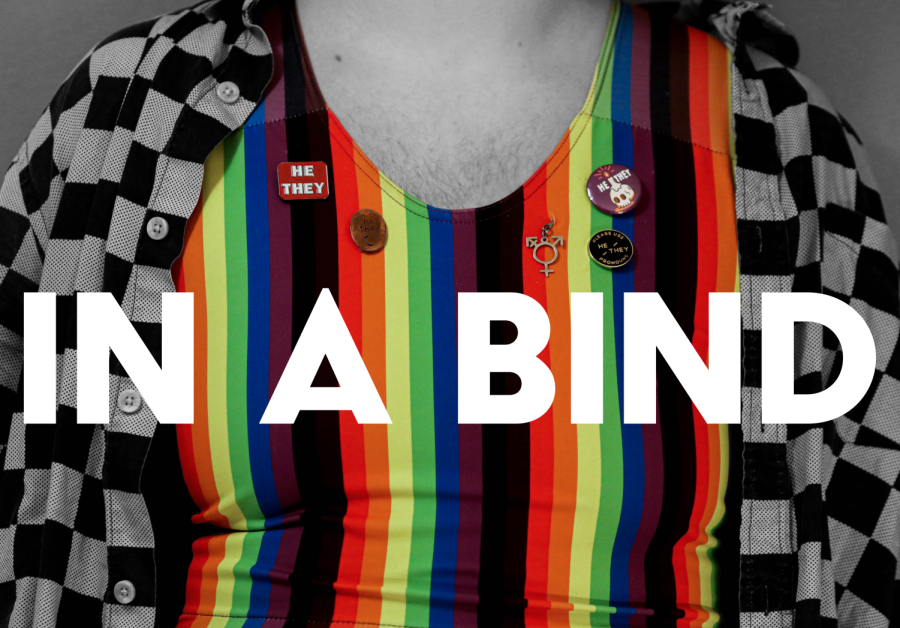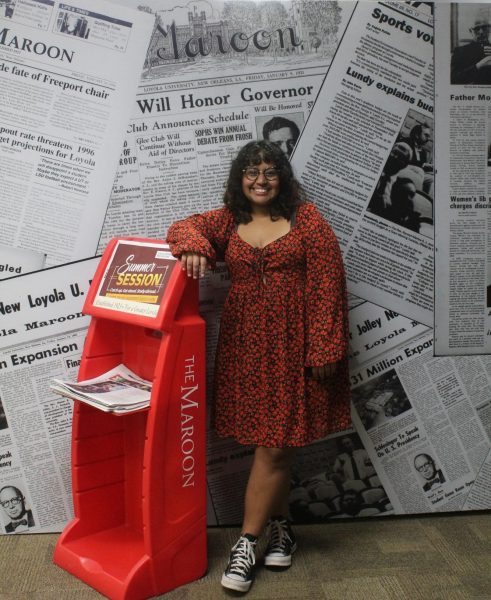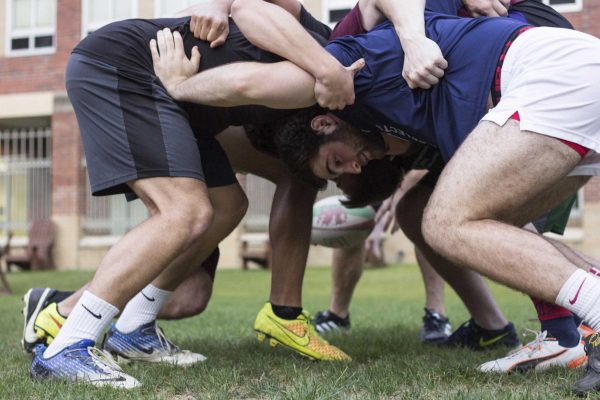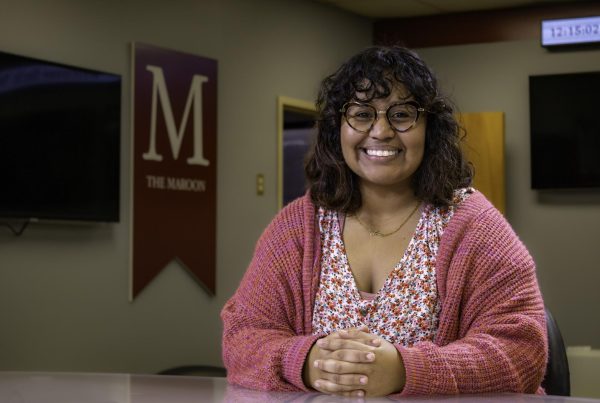COLUMN: As a transgender student, I feel seen, but not heard
A student poses in a Philadelphia pride flag binder, a garment used by transmasculine people to compress their chests.
When you’re transgender at Loyola, you say a silent prayer before walking into gendered bathrooms. When you’re transgender at Loyola, the door to your dorm room reads a name you haven’t used since you were 14. When you’re transgender at Loyola, your professor makes the class sing to you when you change your name.
When you’re transgender at Loyola, you’re isolated from your peers and you learn to only trust other transgender students.
I’m openly queer — I have green hair, piercings, and a pronoun pin for every day of the week. I’m proud of my identity. I’m a transmasculine nonbinary person who lives my life unabashedly loud and flamboyantly. But on campus, I have to censor myself to be treated with respect.
One of the reasons I chose Loyola is because of its reputation as the most diverse and welcoming campus in the state. I was told that everyone would respect me here, that all of my professors would make an effort to get things right. But this hasn’t been my experience.
There are no transgender professors at Loyola. There’s not a single professor that I can connect to and talk about my identity with. While I do have cisgender professors that I feel comfortable with, I don’t have anyone who understands my experiences.
I’m isolated.
I recently changed my name, so I emailed my professors an update about it. All but one of my professors responded to my email. At the beginning of class the next day, that professor made an announcement. He asked students if they had had birthdays recently, then mentioned that “we had a birthday of sorts” today in class.
He looked at me and said “Oliver changed her name. She changed her name to Artie.” Then, he had the class sing “Happy Birthday” to me. Not once, not twice, but three times in different tunes.
I felt my face go hot. I started sweating and it felt like there was cotton between my ears. I am not a she. I made that clear. I keep my pronouns in my email signature, on Canvas, and I wear a button with my pronouns listed almost every day.
It was humiliating. Sitting in the front of the classroom while my peers awkwardly sang “Happy Birthday” to me because I changed my name. I felt sick. I felt ashamed and embarrassed for having changed my name.
I should have just kept this to myself, I thought. The name wasn’t that important.
I wanted to say something. I wanted my peers to say something. But what could I say? What could I ask them to say?
I didn’t say anything. No one said anything. I just went silent.
Experiences like this alienate me from other students. No matter how hard I try not to, I feel spite towards them for not standing up for me. I’m embarrassed to be around them.
The first day of my sophomore year, I walked to my new dorm room, excited to live with my friends in an entirely transgender suite. I was the first to move in.
On the door, all of our names were wrong, except for my roommate who was able to legally change his name. The rest of us were publicly identified with names we haven’t used in years.
I ripped the tags down and never let my other roommates see them. Our door remains empty.
On campus, I hear my deadname three or four times a day. It’s on my student ID. It’s in my email. When I go to the front desk to swipe into my dorm, it’s the name the desk guard says back to me.
Every time, it’s a reminder that I’m not a “real” man. When I was younger and had first come out, it used to make me feel sick when people would misgender me or call me by my deadname.
Now, I’m just numb to it. Getting misgendered and deadnamed has become part of my daily routine; I have been forced to be okay with it. In order to preserve my mental health, I’ve had to learn to be okay with cisgender people treating me like I’m subhuman. I can’t physically or emotionally handle caring anymore. I can’t handle the pain.
If I still let misgendering hurt me, I’d spend every day spiraling.
This is my reality as a transgender person living and learning on campus, and I’m not alone.

Oliver Bennett is a mass communications journalism and sociology major from Dallas, Texas and Natchitoches, Louisiana. This semester, he’s excited to...

Hannah Renton is a senior visual communication major and is working as Photo Editor this semester. She has previously worked as the Design Chief, Assistant...










Andrea • Nov 24, 2021 at 1:42 pm
Hello Artie, I am a parent of a Loyola student (which is why I am reading “The Maroon.” I am also very sorry that you haven’t had a more welcoming experience in school. You might be the bravest person I have ever heard of and I want to let you know you are setting the best example possible for all people, Loyola students and otherwise. Best wishes to you.
Lataine Thomas • Nov 16, 2021 at 12:11 pm
I am so sorry you were put up to shame in class but there is a whole world out here to welcome you. This world is changing you are very brave Just remember they are people out here that support you.
D. BRION EBEY • Nov 17, 2021 at 10:30 am
Too bad all students have not been reading the I Ching or even know what it is . D. Brion Ebey 88